Table of Contents
What Is Relief Factor?
Relief Factor is a health and wellness brand best known for its trio of products. They are formulated to provide users with pain relief, energy, and relaxation.
You may have seen the brand’s advertisements on TV, which features positive customer feedback about its products. Marketed as safe and effective to use, Relief Factor states that they use 4 primary ingredients within their 3-Week QuickStart medicine, which is formulated by a team of physicians located in the Pacific Northwest.
Relief Factor Quickstart Ingredients
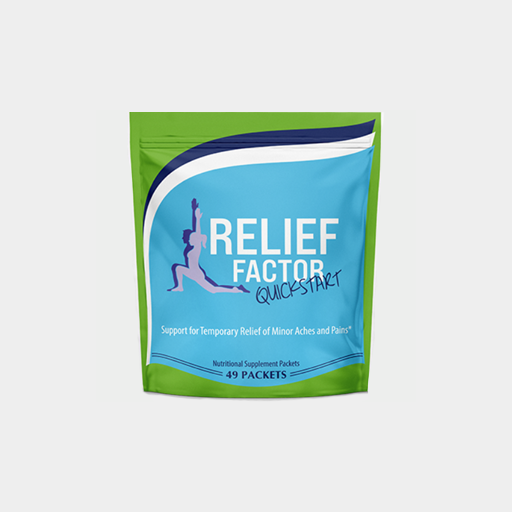
Relief Factor Quickstart is a dietary supplement designed to support healthy inflammatory responses and overall physical function. The product contains a combination of ingredients, including fish oil, turmeric, resveratrol, and icariin, which work synergistically to provide relief from minor aches and pains.
Quickstart comes in convenient packets, making it easy to take on the go, and is recommended to be used in conjunction with the Relief Factor supplement program.
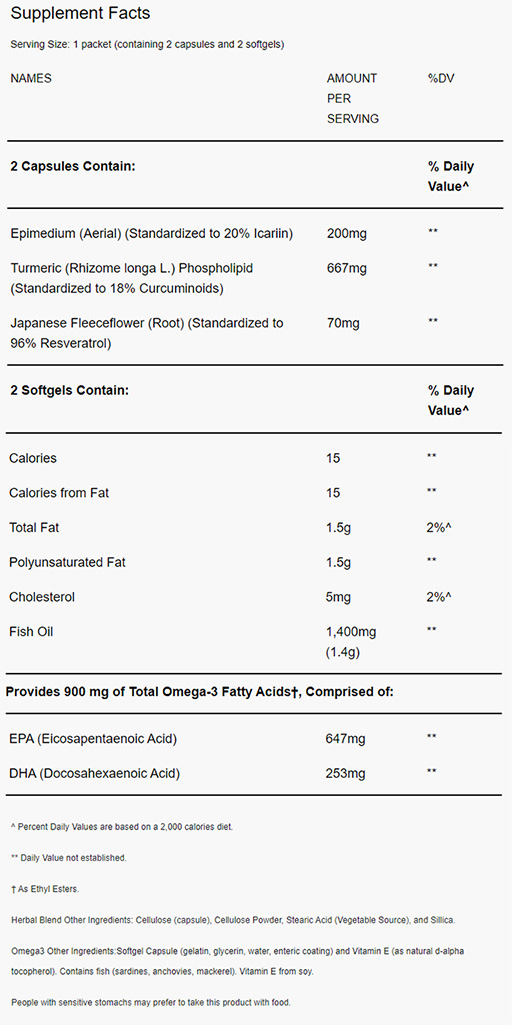
Epimedium (Aerial):
Epimedium, also known as horny goat weed, is an herb that is traditionally used in Chinese medicine as an aphrodisiac and to improve sexual function in both men and women. The plant contains flavonoids, phytoestrogens, and alkaloids that are believed to be responsible for its health benefits.
Some potential benefits of epimedium include improving erectile dysfunction, increasing libido, reducing fatigue, and improving bone density. The herb has also been used to treat a variety of conditions, including cardiovascular disease, osteoporosis, and neurological disorders.
Epimedium is believed to work by increasing blood flow to the genital area, which can improve sexual function. It may also stimulate the production of nitric oxide, a compound that helps to relax blood vessels and improve circulation. Additionally, epimedium may have anti-inflammatory and antioxidant effects, which can help to protect against cellular damage and reduce the risk of chronic diseases.
While there is limited scientific research on the health benefits of epimedium, some studies have shown promising results. However, it is important to note that more research is needed to fully understand the effects of this herb on human health.
As with any herbal supplement, it is important to talk to a healthcare provider before taking epimedium, especially if you are taking any medications or have a medical condition.
Turmeric (Rhizome longa L.) Phospholipid:
Turmeric, also known as Curcuma longa, is a spice that is commonly used in Indian and Asian cuisine. It has been used in traditional medicine for centuries to treat a variety of ailments. Turmeric contains a compound called curcumin, which is believed to be responsible for many of its health benefits.
When turmeric is combined with phospholipids, such as those found in soy lecithin, it increases the bioavailability of curcumin in the body. This means that the body can absorb more curcumin and potentially experience greater health benefits.
Some potential benefits of turmeric and curcumin include reducing inflammation, improving brain function, and reducing the risk of chronic diseases like cancer and heart disease. Curcumin has been shown to have antioxidant and anti-inflammatory properties, which can help to protect against cellular damage and reduce inflammation in the body.
Inflammation is a major contributor to many chronic diseases, including heart disease, diabetes, and cancer. By reducing inflammation, turmeric and curcumin may help to reduce the risk of these diseases. Additionally, curcumin has been shown to improve brain function and may be useful in the treatment of conditions like depression and Alzheimer’s disease.
While there is promising research on the health benefits of turmeric and curcumin, more research is needed to fully understand their effects on human health. It is also important to note that taking high doses of turmeric or curcumin supplements may have side effects, such as gastrointestinal discomfort.
As with any supplement, it is important to talk to a healthcare provider before taking turmeric or curcumin supplements, especially if you are taking any medications or have a medical condition.
Japanese Fleeceflower (Root):
Japanese Fleeceflower, also known as Polygonum cuspidatum or Hu Zhang, is a plant native to East Asia. The root of the plant has been used in traditional Chinese medicine for its health benefits, including its ability to improve circulation, reduce inflammation, and support liver and heart health.
Japanese Fleeceflower contains a compound called resveratrol, which is believed to be responsible for many of its health benefits. Resveratrol is a polyphenol that has been shown to have antioxidant, anti-inflammatory, and anti-cancer properties. It is also believed to be cardioprotective, which means it may help to protect against heart disease.
Some potential benefits of Japanese Fleeceflower root and resveratrol include reducing inflammation, improving circulation, and supporting liver health. Resveratrol has been shown to have anti-inflammatory properties, which can help to reduce inflammation in the body and potentially reduce the risk of chronic diseases like cancer and heart disease.
Additionally, resveratrol has been shown to improve circulation and may be useful in the treatment of conditions like high blood pressure and peripheral artery disease.
Japanese Fleeceflower root may also be beneficial for liver health. It contains compounds that can help to protect the liver from damage and improve liver function. This may be useful in the treatment of liver diseases like hepatitis and cirrhosis.
While there is promising research on the health benefits of Japanese Fleeceflower root and resveratrol, more research is needed to fully understand their effects on human health. It is also important to note that taking high doses of Japanese Fleeceflower root or resveratrol supplements may have side effects, such as gastrointestinal discomfort.
As with any supplement, it is important to talk to a healthcare provider before taking Japanese Fleeceflower root or resveratrol supplements, especially if you are taking any medications or have a medical condition.
EPA (Eicosapentaenoic Acid):
EPA (Eicosapentaenoic Acid) is an omega-3 fatty acid that is found in fatty fish, such as salmon, mackerel, and sardines. EPA is an essential fatty acid, which means that it is necessary for the body to function properly, but cannot be produced by the body and must be obtained through the diet or supplements.
EPA has been shown to have numerous health benefits, including reducing inflammation, improving heart health, and supporting brain function. EPA is known for its anti-inflammatory properties, which can help to reduce inflammation in the body and potentially reduce the risk of chronic diseases like arthritis and heart disease.
EPA is also beneficial for heart health. It can help to lower triglycerides, a type of fat found in the blood that can contribute to heart disease. EPA may also help to lower blood pressure and reduce the risk of blood clots, which can lead to heart attacks and strokes.
EPA is also important for brain function. It is a key component of cell membranes in the brain and has been shown to support brain function and potentially reduce the risk of cognitive decline and dementia.
While EPA can be obtained through the diet, many people do not consume enough EPA-rich foods, which is why supplements may be beneficial. It is important to talk to a healthcare provider before taking EPA supplements, especially if you are taking any medications or have a medical condition.
Additionally, it is important to choose high-quality supplements that have been tested for purity and potency.
DHA (Docosahexaenoic Acid):
DHA (Docosahexaenoic Acid) is an omega-3 fatty acid that is found in high amounts in fatty fish, such as salmon, mackerel, and sardines. DHA is an essential fatty acid, which means that it is necessary for the body to function properly, but cannot be produced by the body and must be obtained through the diet or supplements.
DHA has numerous health benefits, particularly for brain and eye health. It is a key component of the brain and retina, and is essential for the proper development and function of these organs. DHA has been shown to improve cognitive function, including memory, learning, and attention, and may help to reduce the risk of cognitive decline and dementia.
In addition to its benefits for brain and eye health, DHA may also help to reduce inflammation, improve heart health, and support immune function. DHA has been shown to have anti-inflammatory properties, which can help to reduce inflammation in the body and potentially reduce the risk of chronic diseases like arthritis and heart disease.
DHA is also important for heart health. It can help to lower triglycerides, a type of fat found in the blood that can contribute to heart disease. DHA may also help to lower blood pressure and reduce the risk of blood clots, which can lead to heart attacks and strokes.
While DHA can be obtained through the diet, many people do not consume enough DHA-rich foods, which is why supplements may be beneficial. It is important to talk to a healthcare provider before taking DHA supplements, especially if you are taking any medications or have a medical condition. Additionally, it is important to choose high-quality supplements that have been tested for purity and potency.
Relief Factor Calm Ingredients
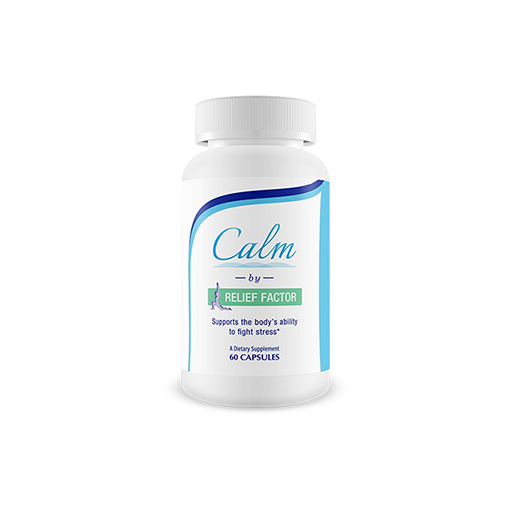
Relief Factor Calm is a dietary supplement that promotes relaxation and a sense of calmness. The product contains a blend of natural ingredients, such as magnesium, ashwagandha, and L-theanine, that work together to support healthy stress responses and encourage restful sleep.
Calm is recommended for those who experience occasional stress and anxiety, and it can be taken as needed or as part of the Relief Factor supplement program. This supplement is non-habit forming and does not cause drowsiness, making it a safe and effective option for those seeking natural stress relief.
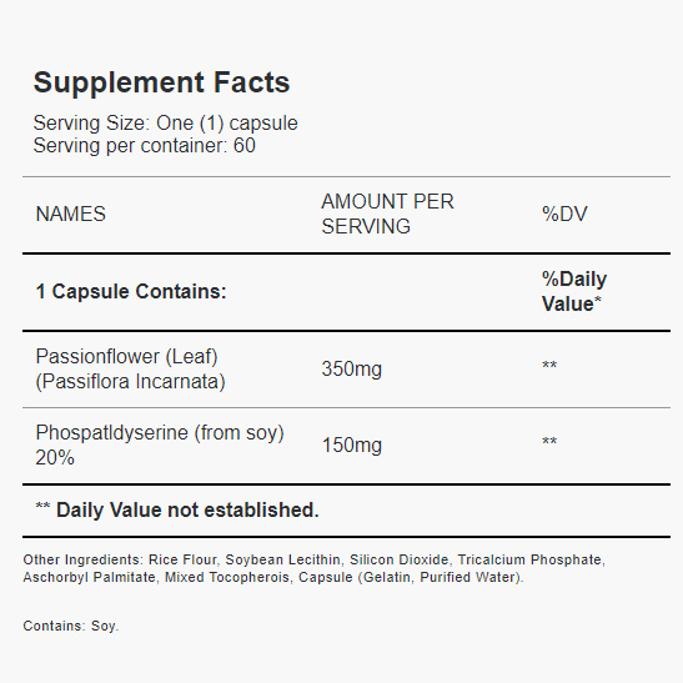
Phosphatidylserine:
Phosphatidylserine (PS) is a type of phospholipid that is found in high concentrations in the brain and other organs, such as the liver and lungs. It is a crucial component of cell membranes and plays a vital role in cell signaling, neurotransmitter release, and overall brain function.
Research has shown that PS has a range of potential health benefits. One of the most well-known benefits is its ability to support cognitive function, including memory, attention, and concentration. Several studies have found that supplementing with PS can improve cognitive performance in individuals with age-related cognitive decline, and may also be beneficial for people with Alzheimer’s disease and other forms of dementia.
PS has also been shown to have anti-inflammatory and antioxidant properties, which can help protect against oxidative stress and chronic disease. It has been suggested that PS supplementation may be beneficial for reducing the risk of heart disease, improving exercise performance, and supporting immune function.
Overall, phosphatidylserine is an essential nutrient that plays a vital role in maintaining optimal brain health and cognitive function. While it is naturally present in some foods, such as soybeans and beef liver, most people do not consume enough PS through their diet alone, making supplementation a potential option for those looking to support their brain and overall health.
However, it is important to consult a healthcare professional before beginning any new supplement regimen.
Passionflower:
Passionflower, also known as Passiflora incarnata, is a plant species that has been used for centuries as a traditional herbal remedy for a range of conditions, including anxiety, insomnia, and gastrointestinal issues.
The plant contains several bioactive compounds, including flavonoids and alkaloids, which are believed to contribute to its health benefits. Some of the potential benefits of passionflower include:
Anxiety relief: Passionflower has been shown to have anxiolytic effects, meaning it can help reduce feelings of anxiety and promote relaxation.
Improved sleep: Passionflower may also have sedative properties, making it beneficial for people with insomnia or other sleep disorders.
Anti-inflammatory effects: Some studies suggest that passionflower may have anti-inflammatory effects, which could be beneficial for reducing pain and inflammation.
Gastrointestinal support: Passionflower has been traditionally used to help support digestive health, and some research suggests that it may be beneficial for reducing symptoms of irritable bowel syndrome (IBS) and other digestive disorders.
Antioxidant properties: Passionflower contains antioxidants, which can help protect against oxidative stress and reduce the risk of chronic disease.
Overall, passionflower is a safe and natural plant-based supplement that may offer a range of health benefits. It can be consumed as a tea, capsule, or tincture, and is generally well-tolerated by most people.
However, it’s important to speak with a healthcare professional before taking passionflower or any other herbal supplement, especially if you are pregnant, nursing, or taking medication.
Relief Factor Energy Ingredients
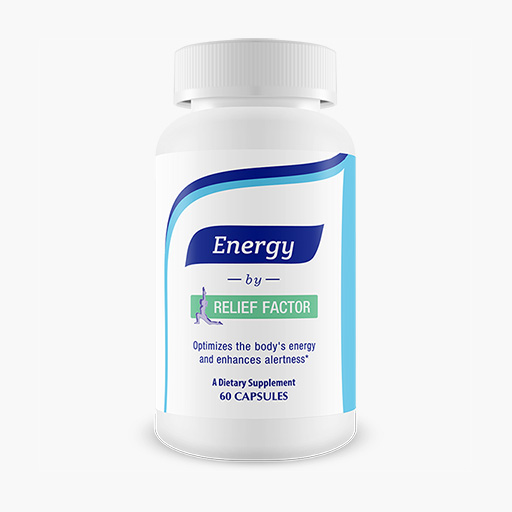
Relief Factor Energy is a dietary supplement designed to provide a natural boost of energy and support healthy cognitive function. The product contains a blend of ingredients, including caffeine, D-ribose, and CoQ10, which work synergistically to enhance mental clarity and focus while also increasing physical endurance.
Energy is recommended for individuals who want to maintain an active lifestyle and combat occasional fatigue. This supplement is non-habit forming and does not cause jitters or crashes, making it a safe and effective option for those seeking a natural energy boost.
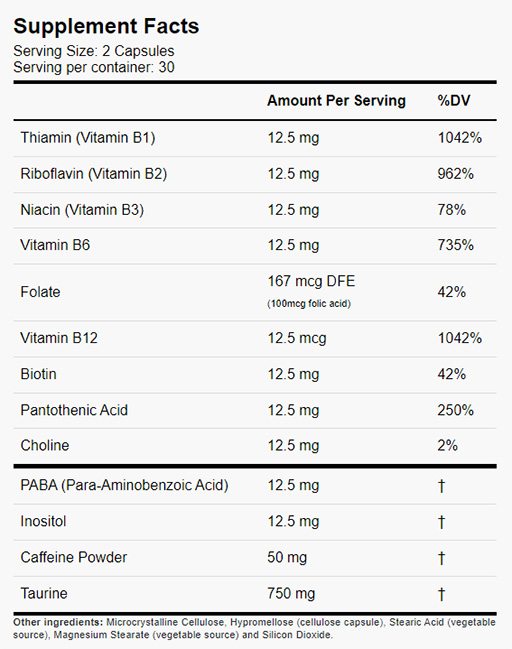
B-Complex:
B-complex refers to a group of eight water-soluble vitamins that are essential for a range of bodily functions. These vitamins include thiamin (B1), riboflavin (B2), niacin (B3), pantothenic acid (B5), pyridoxine (B6), biotin (B7), folate (B9), and cobalamin (B12).
Each B vitamin plays a unique role in the body and has its own set of health benefits. Some of the potential benefits of B-complex vitamins include:
Energy production: B vitamins are essential for converting food into energy, making them important for maintaining healthy metabolism and energy levels.
Nervous system function: Several B vitamins, including thiamin, riboflavin, and pyridoxine, are essential for proper nervous system function, including the production of neurotransmitters.
Red blood cell production: Folate and cobalamin are essential for the production of red blood cells, which carry oxygen throughout the body.
Skin and hair health: Biotin is important for maintaining healthy skin, hair, and nails, and may also help improve skin conditions like acne.
Mood regulation: Several B vitamins, including niacin and pyridoxine, are involved in the production of neurotransmitters like serotonin, which play a role in mood regulation.
B-complex vitamins are naturally present in many foods, including meat, fish, eggs, whole grains, and leafy greens. However, some people may not get enough B vitamins through their diet alone, especially if they follow a vegetarian or vegan diet, have a malabsorption disorder, or consume excess alcohol.
Supplementing with a B-complex vitamin may be beneficial for people who are deficient in one or more B vitamins, or who have conditions that increase their need for B vitamins, such as pregnancy or certain chronic diseases. However, it’s important to speak with a healthcare professional before taking any new supplement, as high doses of some B vitamins can be harmful.
Caffeine:
Caffeine is a naturally occurring stimulant that is found in a variety of foods and beverages, including coffee, tea, chocolate, and certain soft drinks. It is also commonly consumed in supplement form.
Caffeine works by blocking the action of adenosine, a neurotransmitter that promotes sleep and suppresses arousal. This leads to increased alertness and wakefulness, and may also improve cognitive function, including memory and concentration.
Some of the potential benefits of caffeine include:
Increased energy and endurance: Caffeine can help increase energy levels and reduce fatigue, making it beneficial for athletes and people who need to stay alert and focused for extended periods.
Weight loss: Caffeine has been shown to have a thermogenic effect, which can increase metabolism and help burn fat. It may also suppress appetite, making it beneficial for weight loss.
Improved cognitive function: Caffeine can improve cognitive function, including memory, attention, and reaction time. It may also reduce the risk of age-related cognitive decline and diseases like Alzheimer’s.
Mood enhancement: Caffeine can improve mood and reduce feelings of depression, anxiety, and stress.
Reduced risk of chronic disease: Some research suggests that caffeine may help reduce the risk of chronic diseases like Parkinson’s, liver disease, and certain types of cancer.
While caffeine can have many potential health benefits, it is also important to use it in moderation and be aware of its potential side effects, such as anxiety, insomnia, and increased heart rate.
Additionally, individuals who are sensitive to caffeine or have certain health conditions, such as high blood pressure, should speak with a healthcare professional before consuming caffeine or taking caffeine supplements.
Taurine:
Taurine is a type of amino acid that is found naturally in many foods, including meat, fish, and dairy products. It is also commonly added to energy drinks and other supplements.
Taurine plays several important roles in the body, including:
Regulating hydration: Taurine helps regulate the body’s water and electrolyte balance, which is important for maintaining proper hydration levels.
Supporting heart health: Taurine has been shown to have a beneficial effect on the heart, including improving blood flow and reducing the risk of heart disease.
Improving exercise performance: Taurine may improve exercise performance by reducing muscle fatigue and increasing endurance.
Supporting cognitive function: Taurine may help support cognitive function and reduce the risk of neurodegenerative diseases like Alzheimer’s.
Regulating immune function: Taurine has been shown to play a role in regulating immune function, which may help reduce the risk of infection and inflammation.
While taurine is generally considered safe for most people, there is limited research on its long-term effects and potential side effects. Some studies have suggested that high doses of taurine may have negative effects on the liver and kidneys, although more research is needed to fully understand these risks.
It is also important to note that many energy drinks and other products that contain taurine also contain high levels of caffeine and other stimulants, which can have negative effects on health and should be used in moderation.
As with any supplement, it’s important to speak with a healthcare professional before taking taurine or any other new supplement.
Relief Factor Sleep Ingredients
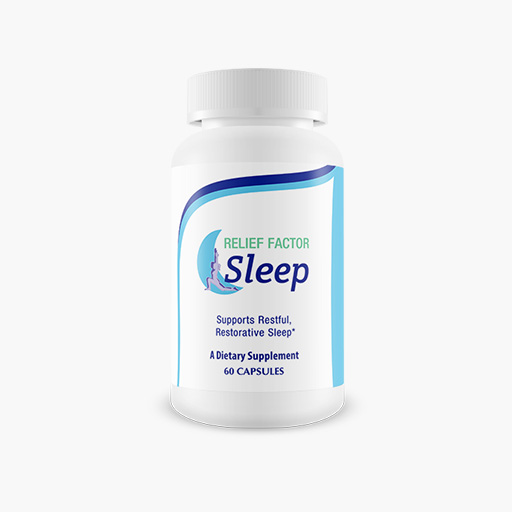
Relief Factor Sleep is a dietary supplement that promotes restful and rejuvenating sleep. The product contains a blend of natural ingredients, including melatonin, magnesium, and L-theanine, that work together to support healthy sleep patterns and encourage relaxation.
Sleep is recommended for those who experience occasional sleeplessness, jet lag, or other disruptions to their sleep schedule. This supplement is non-habit forming and does not cause morning grogginess, making it a safe and effective option for those seeking natural sleep support.
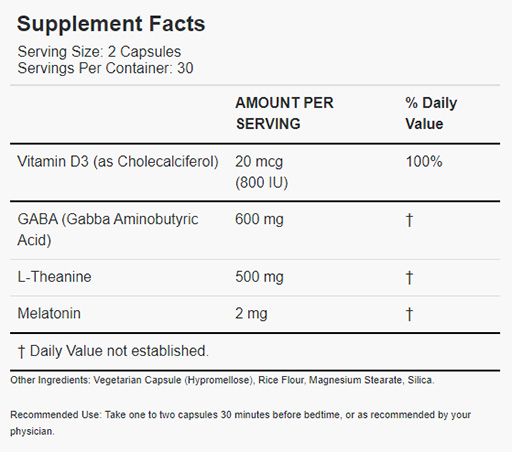
Gaba:
GABA (Gamma-Aminobutyric Acid) is an amino acid and a neurotransmitter that is naturally produced in the brain. It is known to play a key role in regulating the nervous system and is believed to have a range of health benefits.
Some of the potential benefits of GABA include:
Anxiety relief: GABA is believed to have a calming effect on the nervous system, which can help reduce anxiety and stress.
Improved sleep: GABA may help improve sleep quality by promoting relaxation and reducing the time it takes to fall asleep.
Reduced pain: Some studies have suggested that GABA may have pain-relieving properties, making it a potential treatment for conditions like chronic pain.
Improved mood: GABA may have a positive effect on mood by promoting relaxation and reducing feelings of anxiety and depression.
Lowered blood pressure: Some research has suggested that GABA may help lower blood pressure levels, which can reduce the risk of heart disease and stroke.
While GABA is naturally produced in the brain, it is also available in supplement form. However, it is important to note that the effectiveness and safety of GABA supplements is still unclear and more research is needed to fully understand their potential benefits and risks.
Additionally, individuals with certain health conditions, such as epilepsy or bipolar disorder, should speak with a healthcare professional before taking GABA supplements, as they may interact with certain medications or exacerbate symptoms.
L-Theanine:
L-Theanine is an amino acid that is commonly found in tea leaves, particularly in green tea. It is known for its potential calming effects on the body and mind, making it a popular supplement for stress relief and improved cognitive function.
Some of the potential benefits of L-Theanine include:
Stress relief: L-Theanine has been shown to promote relaxation and reduce stress and anxiety.
Improved cognitive function: L-Theanine may have a positive effect on cognitive function, including increased focus and attention, improved memory, and increased mental clarity.
Better sleep quality: L-Theanine may improve sleep quality by promoting relaxation and reducing anxiety.
Cardiovascular health: L-Theanine may help improve cardiovascular health by reducing blood pressure and decreasing the risk of heart disease.
Improved immune function: L-Theanine may also have immune-boosting properties, helping to reduce the risk of infection and illness.
L-Theanine is generally considered safe and well-tolerated, with few reported side effects. However, it is important to note that the effects of L-Theanine may vary depending on individual factors such as age, health status, and dosage.
It is also important to note that L-Theanine is often combined with caffeine in supplements, as the two are believed to have a synergistic effect on cognitive function.
However, individuals who are sensitive to caffeine or have certain health conditions, such as anxiety disorders, should exercise caution when using L-Theanine supplements. As with any supplement, it is always important to consult with a healthcare professional before taking L-Theanine or any other new supplement.
Melatonin:
Melatonin is a hormone that is naturally produced in the body, primarily by the pineal gland in the brain. It plays a key role in regulating the sleep-wake cycle and is commonly used as a supplement to help with sleep problems.
Some of the potential benefits of melatonin include:
Improved sleep quality: Melatonin may help improve sleep quality by promoting relaxation and regulating the sleep-wake cycle.
Reduced insomnia: Melatonin has been shown to be effective in reducing insomnia, particularly in older adults.
Reduced jet lag: Melatonin may help reduce the symptoms of jet lag by regulating the sleep-wake cycle and helping the body adjust to new time zones.
Improved mood: Melatonin may have a positive effect on mood by promoting relaxation and reducing feelings of anxiety and depression.
Antioxidant properties: Melatonin is a powerful antioxidant, which means it can help protect the body against oxidative stress and damage caused by free radicals.
While melatonin is generally considered safe when used in recommended doses, it is important to note that it may interact with certain medications or exacerbate symptoms in individuals with certain health conditions.
Additionally, long-term use of melatonin supplements may have potential risks, such as a decreased ability to produce melatonin naturally.
As with any supplement, it is always important to consult with a healthcare professional before taking melatonin or any other new supplement, particularly if you have any pre-existing health conditions or are taking any medications.
Vitamin-D:
Vitamin D3, also known as cholecalciferol, is a type of vitamin D that is naturally produced in the body when the skin is exposed to sunlight. It is also available in supplement form and is a vital nutrient for overall health and well-being.
Some of the potential benefits of vitamin D3 include:
Stronger bones: Vitamin D3 plays a key role in calcium absorption, which is essential for strong bones and teeth.
Improved immune function: Vitamin D3 may help improve immune function, reducing the risk of infection and illness.
Reduced risk of chronic disease: Vitamin D3 may help reduce the risk of chronic diseases such as heart disease, diabetes, and certain types of cancer.
Improved mood: Vitamin D3 may have a positive effect on mood, reducing symptoms of depression and improving overall mental health.
Reduced inflammation: Vitamin D3 may help reduce inflammation throughout the body, which is a contributing factor to many chronic diseases.
It is estimated that up to 50% of the population may be deficient in vitamin D3, particularly in areas with limited sunlight exposure or with darker skin tones. As such, supplementation with vitamin D3 is often recommended, particularly during the winter months or for individuals who are unable to obtain adequate sunlight exposure.
While vitamin D3 is generally considered safe, it is important to note that excessive doses can lead to toxicity.
Additionally, some individuals may be more sensitive to vitamin D3 supplements or may have underlying health conditions that make supplementation less appropriate. As with any supplement, it is always important to consult with a healthcare professional before taking vitamin D3 or any other new supplement.
References
1. Indran, I.R., et al., Preclinical studies and clinical evaluation of compounds from the genus Epimedium for osteoporosis and bone health. Pharmacology & Therapeutics, 2016. 162: p. 188-205. https://www.sciencedirect.com/science/article/abs/pii/S0163725816000164
2. Huang, S., et al., Anti-inflammatory activity of Epimedium brevicornu Maxim ethanol extract. Journal of Medicinal Food, 2018. 21(7): p. 726-733. https://www.liebertpub.com/doi/abs/10.1089/jmf.2017.4088
3. Mosovska, S., et al., Antioxidant properties of curcuminoids isolated from Curcuma longa L. Acta Chimica Slovaca, 2016. 9(2): p. 130. https://sciendo.com/downloadpdf/journals/acs/9/2/article-p130.pdf
4. Abd El‐Hack, M.E., et al., Curcumin, the active substance of turmeric: Its effects on health and ways to improve its bioavailability. Journal of the Science of Food and Agriculture, 2021. 101(14): p. 5747-5762. https://onlinelibrary.wiley.com/doi/abs/10.1002/jsfa.11372
5. He, Y., et al., Curcumin, inflammation, and chronic diseases: How are they linked? Molecules, 2015. 20(5): p. 9183-9213. https://www.mdpi.com/1420-3049/20/5/9183
6. Ahmed, T. and A.H. Gilani, Therapeutic potential of turmeric in Alzheimer’s disease: Curcumin or curcuminoids? Phytotherapy Research, 2014. 28(4): p. 517-525. https://onlinelibrary.wiley.com/doi/abs/10.1002/ptr.5030
7. Wang, D.-G., W.-Y. Liu, and G.-T. Chen, A simple method for the isolation and purification of resveratrol from Polygonum cuspidatum. Journal of Pharmaceutical Analysis, 2013. 3(4): p. 241-247. https://www.sciencedirect.com/science/article/pii/S2095177912001426
8. Kaur, A., et al., Resveratrol: A vital therapeutic agent with multiple health benefits. Drug Research, 2022. 72(01): p. 5-17. https://www.thieme-connect.com/products/ejournals/html/10.1055/a-1555-2919
9. Meng, T., et al., Anti-inflammatory action and mechanisms of resveratrol. Molecules, 2021. 26(1): p. 229. https://www.mdpi.com/1420-3049/26/1/229
10. Faghihzadeh, F., A. Hekmatdoost, and P. Adibi, Resveratrol and liver: A systematic review. Journal of Research in Medical Sciences, 2015. 20(8): p. 797. https://www.ncbi.nlm.nih.gov/pmc/articles/PMC4652315/
11. Stark, K.D., et al., Global survey of the omega-3 fatty acids, docosahexaenoic acid and eicosapentaenoic acid in the blood stream of healthy adults. Progress in Lipid Research, 2016. 63: p. 132-152. https://www.sciencedirect.com/science/article/pii/S0163782715300333
12. Balvers, M.G., et al., Docosahexaenoic acid and eicosapentaenoic acid are converted by 3T3-L1 adipocytes to N-acyl ethanolamines with anti-inflammatory properties. Biochimica et Biophysica Acta (BBA)-Molecular and Cell Biology of Lipids, 2010. 1801(10): p. 1107-1114. https://www.sciencedirect.com/science/article/abs/pii/S1388198110001447
13. Iketani, T., K. Takazawa, and A. Yamashina, Effect of eicosapentaenoic acid on central systolic blood pressure. Prostaglandins, Leukotrienes and Essential Fatty Acids, 2013. 88(2): p. 191-195. https://www.sciencedirect.com/science/article/abs/pii/S0952327812001925
14. Narayan, B., K. Miyashita, and M. Hosakawa, Physiological effects of eicosapentaenoic acid (EPA) and docosahexaenoic acid (DHA)—A review. Food Reviews International, 2006. 22(3): p. 291-307. https://www.tandfonline.com/doi/abs/10.1080/87559120600694622
15. Calder, P.C., Docosahexaenoic acid. Annals of Nutrition and Metabolism, 2016. 69(Suppl. 1): p. 8-21. https://www.karger.com/Article/Abstract/448262
16. Li, J., et al., Health benefits of docosahexaenoic acid and its bioavailability: A review. Food Science & Nutrition, 2021. 9(9): p. 5229-5243. https://onlinelibrary.wiley.com/doi/full/10.1002/fsn3.2299
17. Chapkin, R.S., et al., Mechanisms by which docosahexaenoic acid and related fatty acids reduce colon cancer risk and inflammatory disorders of the intestine. Chemistry and Physics of Lipids, 2008. 153(1): p. 14-23. https://www.sciencedirect.com/science/article/abs/pii/S0009308408000285
18. Theobald, H.E., et al., Low-dose docosahexaenoic acid lowers diastolic blood pressure in middle-aged men and women. The Journal of Nutrition, 2007. 137(4): p. 973-978. https://academic.oup.com/jn/article/137/4/973/4664735
19. Kim, H.-Y., B.X. Huang, and A.A. Spector, Phosphatidylserine in the brain: Metabolism and function. Progress in Lipid Research, 2014. 56: p. 1-18. https://www.sciencedirect.com/science/article/abs/pii/S0163782714000289
20. Glade, M.J. and K. Smith, Phosphatidylserine and the human brain. Nutrition, 2015. 31(6): p. 781-786. https://www.sciencedirect.com/science/article/abs/pii/S0899900714004523
21. Burstyn-Cohen, T. and A. Maimon, TAM receptors, Phosphatidylserine, inflammation, and cancer. Cell Communication and Signaling, 2019. 17(1): p. 1-9. https://biosignaling.biomedcentral.com/articles/10.1186/s12964-019-0461-0
22. Nojoumi, M., et al., Effects of passion flower extract, as an add-on treatment to sertraline, on reaction time in patients with generalized anxiety disorder: A double-blind placebo-controlled study. Iranian Journal of Psychiatry, 2016. 11(3): p. 191. https://www.ncbi.nlm.nih.gov/pmc/articles/PMC5139955/
23. Okpanyi, S., et al., Do Valerian, Melissa and Passion flower and their combination have an anxiolytic effect? Preclinical evidence. Planta Medica, 2015. 81(16): p. PW_132. https://www.thieme-connect.com
24. Ngan, A. and R. Conduit, Passionflower tea consumption and sleep health, in Tea Consumption and Health. 2012, Nova Science Publishers. p. 195-214. https://researchrepository.rmit.edu.au
25. Hameed, I.H., M.R.C. Cotos, and M.Y. Hadi, Antimicrobial, antioxidant, hemolytic, anti-anxiety, and antihypertensive activity of passiflora species. Research Journal of Pharmacy and Technology, 2017. 10(11): p. 4079-4084. https://www.indianjournals.com
26. Colón, J., The gastrointestinal system, nutrition, and sleep. Integrative Sleep Medicine, 2021: p. 149. https://academic.oup.com
27. Hrubša, M., et al., Biological properties of vitamins of the B-complex, part 1: Vitamins B1, B2, B3, and B5. Nutrients, 2022. 14(3): p. 484. https://www.mdpi.com/2072-6643/14/3/484
28. Gonçalves, A.-C. and G.-V. Portari, The B-complex vitamins related to energy metabolism and their role in exercise performance: A narrative review. Science & Sports, 2021. 36(6): p. 433-440. https://www.sciencedirect.com/science/article/abs/pii/S0765159721000411
29. Bellows, L., et al., Water-soluble vitamins: B-complex and vitamin C. Food and Nutrition Series Health, 2012. 9312. https://extension.colostate.edu/docs/foodnut/09312.pdf
30. Laquale, K.M., B-complex vitamins’ role in energy release. Athletic Therapy Today, 2006. https://vc.bridgew.edu/mahpls_fac/25/
31. Walth, C.B., et al., Response to:“Rethinking biotin therapy for hair, nail, and skin disorders”. Journal of the American Academy of Dermatology, 2018. 79(6): p. e121-e124. https://www.jaad.org/article/S0190-9622(18)32362-4/fulltext
32. Mikkelsen, K. and V. Apostolopoulos, Vitamin B1, B2, B3, B5, and B6 and the Immune System. Nutrition and Immunity, 2019: p. 115-125. https://link.springer.com/chapter/10.1007/978-3-030-16073-9_7
33. de Mejia, E.G. and M.V. Ramirez-Mares, Impact of caffeine and coffee on our health. Trends in Endocrinology & Metabolism, 2014. 25(10): p. 489-492. https://www.sciencedirect.com/science/article/abs/pii/S1043276014001283
34. Graham, T.E., Caffeine and exercise: Metabolism, endurance and performance. Sports Medicine, 2001. 31: p. 785-807. https://link.springer.com/article/10.2165/00007256-200131110-00002
35. Greenway, F., The safety and efficacy of pharmaceutical and herbal caffeine and ephedrine use as a weight loss agent. Obesity Reviews, 2001. 2(3): p. 199-211. https://onlinelibrary.wiley.com/doi/abs/10.1046/j.1467-789x.2001.00038.x
36. Ruxton, C.H., The impact of caffeine on mood, cognitive function, performance and hydration: A review of benefits and risks. Nutrition Bulletin, 2008. 33(1): p. 15-25. https://onlinelibrary.wiley.com/doi/abs/10.1111/j.1467-3010.2007.00665.x
37. Castillo, M., et al., Coffee antioxidants in chronic diseases, in Coffee: Consumption and health implications. 2019, Royal Society of Chemistry. p. 20-56. https://www.researchgate.net
38. Birdsall, T.C., Therapeutic applications of taurine. Alternative Medicine Review: A journal of Clinical Therapeutic, 1998. 3(2): p. 128-136. https://europepmc.org/article/med/9577248
39. Siefken, W., et al., Role of taurine accumulation in keratinocyte hydration. Journal of Investigative Dermatology, 2003. 121(2): p. 354-361. https://www.sciencedirect.com/science/article/pii/S0022202X15303729
40. Ito, T., S. Schaffer, and J. Azuma, The effect of taurine on chronic heart failure: Actions of taurine against catecholamine and angiotensin II. Amino Acids, 2014. 46: p. 111-119. https://link.springer.com/article/10.1007/s00726-013-1507-z
41. Kurtz, J.A., et al., Taurine in sports and exercise. Journal of the International Society of Sports Nutrition, 2021. 18(1): p. 39. https://link.springer.com/article/10.1186/s12970-021-00438-0
42. Chen, C., et al., Roles of taurine in cognitive function of physiology, pathologies and toxication. Life Sciences, 2019. 231: p. 116584. https://www.sciencedirect.com/science/article/abs/pii/S0024320519305107
43. Yan, L.C., et al., Dietary taurine supplementation to a plant protein source‐based diet improved the growth and intestinal immune function of young grass carp (Ctenopharyngodon idella). Aquaculture Nutrition, 2019. 25(4): p. 873-896. https://onlinelibrary.wiley.com/doi/abs/10.1111/anu.12907
44. Diez-Gutierrez, L., et al., Gamma-aminobutyric acid and probiotics: Multiple health benefits and their future in the global functional food and nutraceuticals market. Journal of Functional Foods, 2020. 64: p. 103669. https://www.sciencedirect.com/science/article/pii/S1756464619305936
45. Mann, J.J., et al., Anxiety in major depression and cerebrospinal fluid free gamma‐aminobutyric acid. Depression and Anxiety, 2014. 31(10): p. 814-821. https://onlinelibrary.wiley.com/doi/abs/10.1002/da.22278
46. Hepsomali, P., et al., Effects of oral gamma-aminobutyric acid (GABA) administration on stress and sleep in humans: a systematic review. Frontiers in Neuroscience, 2020. 14: p. 923. https://www.frontiersin.org/articles
47. Goldberg, J.S., Selected gamma aminobutyric acid (GABA) esters may provide analgesia for some central pain conditions. Perspectives in Medicinal Chemistry, 2010. 4: p. PMC. S5490. https://journals.sagepub.com/doi/pdf/10.4137/PMC.S5490
48. Streeter, C.C., et al., Effects of yoga on the autonomic nervous system, gamma-aminobutyric-acid, and allostasis in epilepsy, depression, and post-traumatic stress disorder. Medical Hypotheses, 2012. 78(5): p. 571-579. https://www.sciencedirect.com/science/article/abs/pii/S0306987712000321
49. Nishimura, M., et al., Effects of white rice containing enriched gamma-aminobutyric acid on blood pressure. Journal of Traditional and Complementary Medicine, 2016. 6(1): p. 66-71. https://www.sciencedirect.com/science/article/pii/S2225411014000364
50. Juneja, L.R., et al., L-theanine—a unique amino acid of green tea and its relaxation effect in humans. Trends in Food Science & Technology, 1999. 10(6-7): p. 199-204. https://www.sciencedirect.com/science/article/abs/pii/S0924224499000448
51. Kimura, K., et al., L-Theanine reduces psychological and physiological stress responses. Biological Psychology, 2007. 74(1): p. 39-45. https://www.sciencedirect.com/science/article/abs/pii/S0301051106001451
52. Owen, G.N., et al., The combined effects of L-theanine and caffeine on cognitive performance and mood. Nutritional Neuroscience, 2008. 11(4): p. 193-198. https://www.tandfonline.com/doi/abs/10.1179/147683008X301513
53. Dasdelen, M.F., et al., A novel theanine complex, Mg-L-Theanine improves sleep quality via regulating brain electrochemical activity. Frontiers in Nutrition, 2022. 9: p. 570. https://www.frontiersin.org/articles
54. Vuong, Q.V., M.C. Bowyer, and P.D. Roach, L‐Theanine: Properties, synthesis and isolation from tea. Journal of the Science of Food and Agriculture, 2011. 91(11): p. 1931-1939. https://onlinelibrary.wiley.com/doi/abs/10.1002/jsfa.4373
55. Maestroni, G.J., The immunoneuroendocrine role of melatonin. Journal of Pineal Research, 1993. 14(1): p. 1-10. https://onlinelibrary.wiley.com/doi/abs/10.1111/j.1600-079X.1993.tb00478.x
56. Zhdanova, I.V. and R.J. Wurtman, Efficacy of melatonin as a sleep-promoting agent. Journal of Biological Rhythms, 1997. 12(6): p. 644-650. https://journals.sagepub.com/doi/pdf/10.1177/074873049701200620
57. Brown, G.M., et al., Melatonin and its relevance to jet lag. Travel Medicine and Infectious Disease, 2009. 7(2): p. 69-81. https://www.sciencedirect.com/science/article/abs/pii/S1477893908001270
58. De Crescenzo, F., et al., Melatonin as a treatment for mood disorders: A systematic review. Acta Psychiatrica Scandinavica, 2017. 136(6): p. 549-558. https://onlinelibrary.wiley.com/doi/abs/10.1111/acps.12755
59. Karaaslan, C. and S. Suzen, Antioxidant properties of melatonin and its potential action in diseases. Current Topics in Medicinal Chemistry, 2015. 15(9): p. 894-903. https://www.ingentaconnect.com/content/ben/ctmc/2015/00000015/00000009/art00009
60. Di Rosa, M., et al., Vitamin D3: A helpful immuno‐modulator. Immunology, 2011. 134(2): p. 123-139. https://onlinelibrary.wiley.com/doi/full/10.1111/j.1365-2567.2011.03482.x
61. Lanham‐New, S., et al., Importance of vitamin D, calcium and exercise to bone health with specific reference to children and adolescents. Nutrition Bulletin, 2007. 32(4): p. 364-377. https://onlinelibrary.wiley.com/doi/full/10.1111/j.1467-3010.2007.00670.x
62. Hewison, M., Vitamin D and immune function: An overview. Proceedings of the Nutrition Society, 2012. 71(1): p. 50-61. https://www.cambridge.org/core/journals
63. Wang, H., et al., Vitamin D and chronic diseases. Aging and Disease, 2017. 8(3): p. 346. https://www.ncbi.nlm.nih.gov/pmc/articles/PMC5440113/
64. Penckofer, S., et al., Vitamin D supplementation improves mood in women with type 2 diabetes. Journal of Diabetes Research, 2017. 2017. https://www.hindawi.com/journals/jdr/2017/8232863/
65. Cannell, J.J., W.B. Grant, and M.F. Holick, Vitamin D and inflammation. Dermato-Endocrinology, 2014. 6(1): p. e983401. https://www.tandfonline.com/doi/full/10.4161/19381980.2014.983401
Next, you might also like to read about the ingredients in Ka’Chava Bars or FLO Gummies.

Leave a Reply